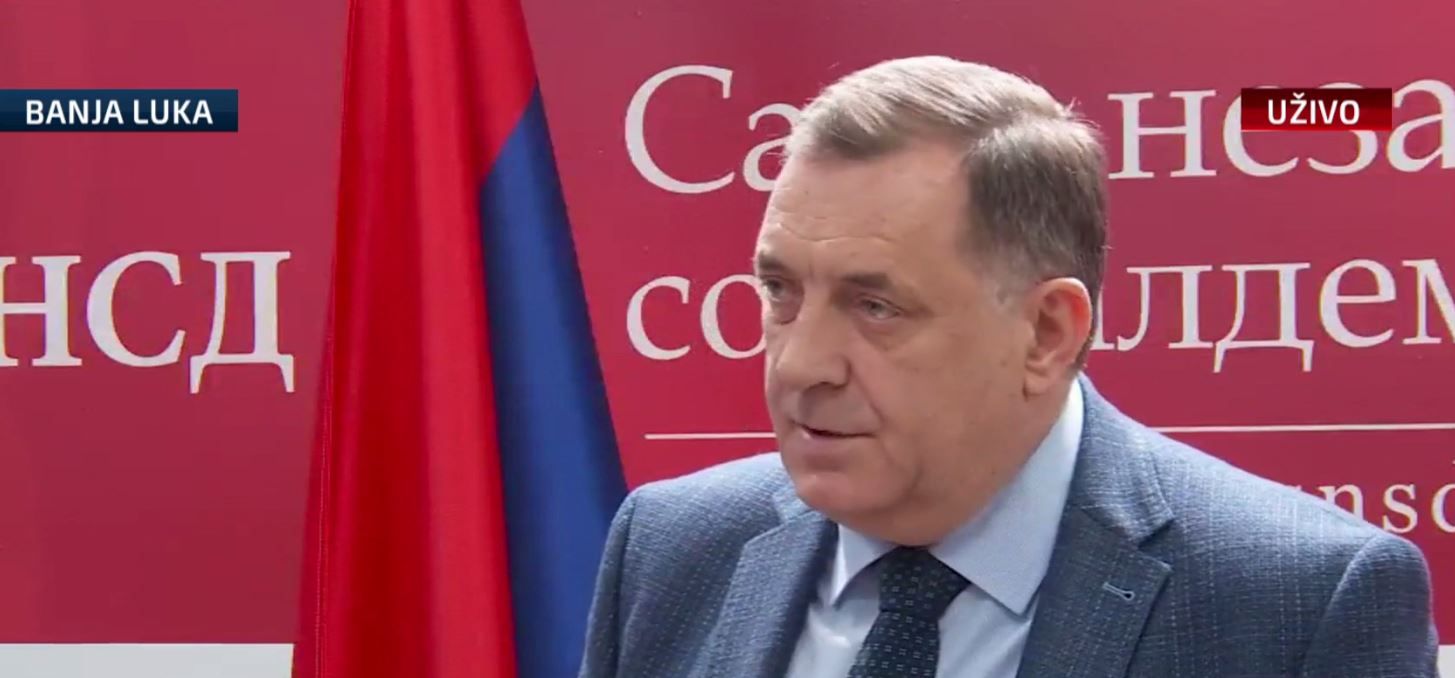
Bosnian Serb leader Milorad Dodik labelled statements made by the leaders of pro-Bosnian parties who said they would not allow the disintegration of the country and their calls upon the international community to intervene as “outbursts” of hate towards Serbs on Thursday.
Dodik’s press conference came a day after the leader of the main Bosniak party in the country, the Party of Democratic Action (SDA), Bakir Izetbegovic, the leader of the Union for a Better Future (SBB), Fahrudin Radoncic and the leader of the Democratic Front (DF) and Bosnian Croat Presidency member, Zeljko Komsic, held theirs in Sarajevo.
The conference of the three was an “obvious attack and outburst of hate toward Serbia and its President, toward Republika Srpska and everything that they and their history are,” Dodik said.
Izetbegovic, Radoncic and Komsic were commenting on Dodik's recent statements in which he mentioned the possibility of the secession of Bosnia's Serb-dominated Republika Srpska (RS) entity.
“We warn the international community, especially the Peace Implementation Council (PIC) and the Office of the High Representative (OHR) that it is due time for steps to be taken in order to prevent the crisis which Milorad Dodik caused from escalating which would have unpredictable consequences,” Izetbegovic said.
He urged neighbouring Serbia to respect the 1995 Dayton Peace Agreement which ended Bosnia’s war, to “respect sovereign equality” and refrain from “threats, use of force and endangering (Bosnia’s) integrity.”
Last week, the Parliament of the semi-autonomous Republika Srpska adopted a set of conclusions including an instruction to all RS representatives in state institutions to stop participating in any decision-making processes until a law that would remove foreign judges from Bosnia’s Constitutional Court is adopted.
This means that state institutions are blocked.
The move came after the Constitutional Court declared that public agricultural property in Republika Srpska should be owned by the state and not by the RS.
According to the Constitution, which is part of the 1995 Dayton Peace Agreement, the Constitutional Court is composed of nine judges - two Bosniaks, two Croats, two Serbs and three foreigners. The foreign judges are named by the President of the European Court of Human Rights.
Dodik has been accusing the institution of working against Republika Srpska, arguing that the three foreign judges frequently side with the Bosniaks and outvote the Croats and the Serbs.
The Bosnian Serb leader has been mentioning the secession of the RS from Bosnia as a possible solution for the crisis. He said last weekend that there is no plan for such a move, but that “we aren’t excluding that option either.”
Serbia’s President, Aleksandar Vucic, has declared that his country respects the sovereignty and integrity of Bosnia and Herzegovina, but has also expressed support for Dodik’s positions on Bosnia’s Constitutional Court.
Komsic, Izetbegovic and Radoncic declared they will “stand up to attacks on state institutions” and “will not support changes to the composition of the Constitutional Court.”
Dodik called those statements an attack “orchestrated, above all, with the goal to cement the violence that is being executed through institutions that were set up by the Dayton (Peace Agreement), but decisions which are completely contrary to the Dayton Agreement are being made,” he said.
Serbia “bothers Izetbegovic and the others because it is stable and achieved significant progress under (Aleksandar) Vucic,” Dodik said, referring to Serbia’s president.
“They know this well, if they remove Vucic, Serbia will enter into decades-long instability and an unstable Serbia suits them,” he said.
He also stressed that the administrative centre of the RS, Banja Luka, “belongs to Serbs” and that it “belongs more to Vucic and supports him more than it will ever support Izetbegovic and his followers.”
He also praised Vucic, saying the Serbian leader is “a man of peace in the region” and that “Serbia is a stabilising factor.”
“There is no plan of the secession of the RS,” Dodik said, adding that the entity government never made such a decision.
“The RS has a legitimate goal and it prefers its activities to be within the scope of the original Dayton Agreement,” he concluded.
Kakvo je tvoje mišljenje o ovome?
Učestvuj u diskusiji ili pročitaj komentare





 Srbija
Srbija
 Hrvatska
Hrvatska
 Slovenija
Slovenija







